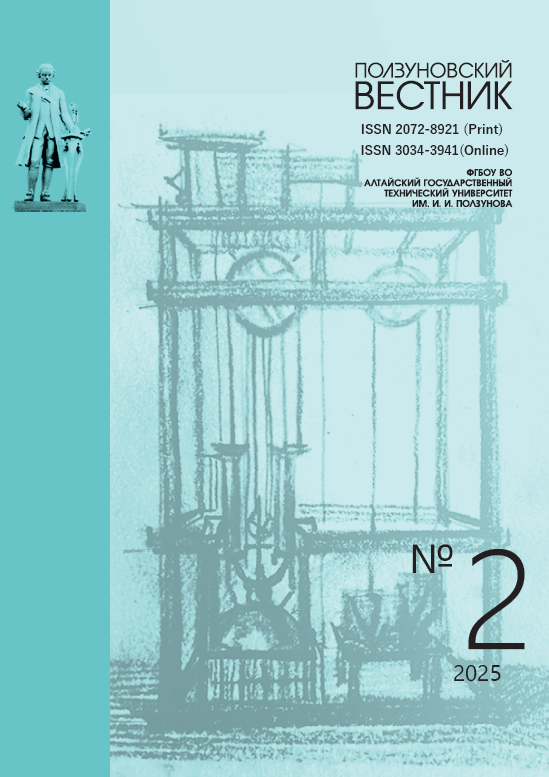TYPICAL PROBLEMS OF LABOR PRODUCTIVITY OF TECHNOLOGICAL PROCESSES AT MEAT PROCESSING ENTERPRISES
NNMVET
DOI:
https://doi.org/10.25712/ASTU.2072-8921.2025.02.009Keywords:
optimization, improvement, typical problems, solutions, production processes, meat industry, meat processing industry, production planning.Abstract
To ensure successful business operations, enterprise management is required, which includes not only instant coordination and control of production processes, but also long-term planning based on solving three key issues. In different periods of the company's life cycle, these issues can be solved in different ways, but many experts believe that if goods are produced taking into account the needs of the consumer, then management becomes more automated. Production in the meat processing industry has its own specifics related to the physico-chemical properties of raw materials and the peculiarities of production technologies. These features determine certain requirements for the organization of the production process, such as mandatory compliance with SanPiNs, technical regulations of the Customs Union, sanitary and hygienic requirements and veterinary and sanitary rules. Thus, it has become relevant to consider several meat industry enterprises and identify the main, typical problems of the production process. The purpose of the research was to develop recommendations for improving the production processes of meat processing enterprises in general. To improve the effectiveness of this industry, it is necessary to identify groups of problems, their sources, and carry out corrective and preventive actions. The application of a systematic approach to solving emerging problems makes it possible to effectively achieve the goals set in the priority areas of state development within the framework of the National Project "Increasing Labor Productivity". To achieve these objectives, an analysis of 3 meat industry enterprises located in the Kemerovo region, Kuzbass and Altai Territory was carried out. The analysis was based on observation, registration of problems, identification of causes and development of standard solutions to eliminate typical problems in the production process, in order to increase the efficiency of meat processing enterprises. In the course of the research, the identified problems are combined into blocks: production planning; excessive stocks of raw materials and finished products; low production workers; low shift productivity of departments. Having tested the proposed solutions at meat industry enterprises, the expected results were revealed.
References
Пилюгин А.Б., Юртайкин Е.А. Процессный подход к информационному менеджменту // Ползуновский вестник. 2006. № 1. С. 181–190.
Influence of management automation on mana-gerial decision-making in the agro-industrial complex / S. Dokholyan [и др.] // nternational Journal of Advanced Computer Science and Applications. 2022. Т. 13. № 6. С. 597–603. doi: 10.14569/IJACSA.2022.0130672.
Трофимова Н.Б., Ермолаева Е.О., Трофимов И.Е. Разработка программного продукта для автоматизации учета несоответствий и нарушений критических пределов на производстве // Техника и технология пищевых производств. 2020. Т. 50. № 1. С. 167–175. doi: 10.21603/2074-9414-2020-1-167-175.
Петрунина И.В. Микроэлементное нормирование труда на предприятиях мясной отрасли // Мясная индустрия. 2020. № 9. С. 14-16. doi: 10.37861/2618-8252-2020-9-14-20.
Аспекты внедрения систем менеджмента безопасности труда на мясоперерабатывающих предприятиях / Крюченко Е.В. [и др.] // Мясная индустрия. 2019. № 6. С. 22–25.
Никитина М.А., Захаров А.Н. Бережливое производство как инструмент повышения производительности труда и повышения качества продукции. Все о мясе. 2020. № 1. С. 25–30. doi: 10.21323/2071-2499-2020-1-25-29.
Шнайдер В.В. Современный интерес к концепции устойчивого развития организации // Гуманитарные балканские исследования. 2019. Т. 3. № 4 (6). С. 71–74. doi: 10.34671/SCH.HBR.2019.0304.0018.
Integrating corporate social responsibility (CSR) into ISO management systems – in search of a feasible CSR management system framework / P. Castka [и др.] // The TQM Magazine. 2004. Т. 16. № 3. С. 216–224. doi: 10.1108/09544780410532954.
Лукьянов В.И. Баланс устойчивого экономического развития организаций // Пищевая промышленность. 2008. № 1. С. 32–33.
Лукьянов В.И. Уверенная поступь : баланс устойчивого экономического развития организаций // Российское предпринимательство. 2007. № 9–2. С. 41–44.
Есина А.Р. Особенности организации производственного процесса на предприятиях мясной промышленности // Научные исследования и разработки. Экономика фирмы. 2013. Т. 2. № 2. С. 39–44.
Ермолаева Е.О. Актуальность автоматизации процесса планирования производства в агропромышленном комплексе: Инновационный кон-вент «Кузбасс: образование, наука, инновации» : материалы XII Инновационного конвента. Кемерово : КемГУ, 2024. С. 88–90.
Титоренко Е.Ю., Ермолаева Е.О. Мотивация персонала как гарантия стабильности качества // Пожарная безопасность, системы жизнеобеспечения, промышленные технологии: проблемы и перспективы : материалы I Международной научно-практической конференции. Кемерово : КемГУ, 2024. С. 146–148.
Строителева Т.Г. Особенности формирования мотивации труда в современных условиях // Ползуновский вестник. 2006. № 1. С. 205–207.
Строителева Т.Г., Гатаулин Д.В. Становление и развитие мотивации труда и трудовых отношений на промышленных предприятиях // Ползуновский вестник. 2006. № 3–1. С. 168–170.
Downloads
Published
How to Cite
Issue
Section
License
Copyright (c) 2025 Evgeniya O. Ermolaeva, Yurij V. Beznosov, Elena Yu. Titorenko, Yuliya V. Ustinova

This work is licensed under a Creative Commons Attribution 4.0 International License.















 .
. This work is licensed under a
This work is licensed under a 
